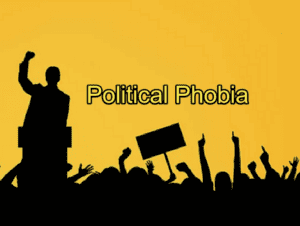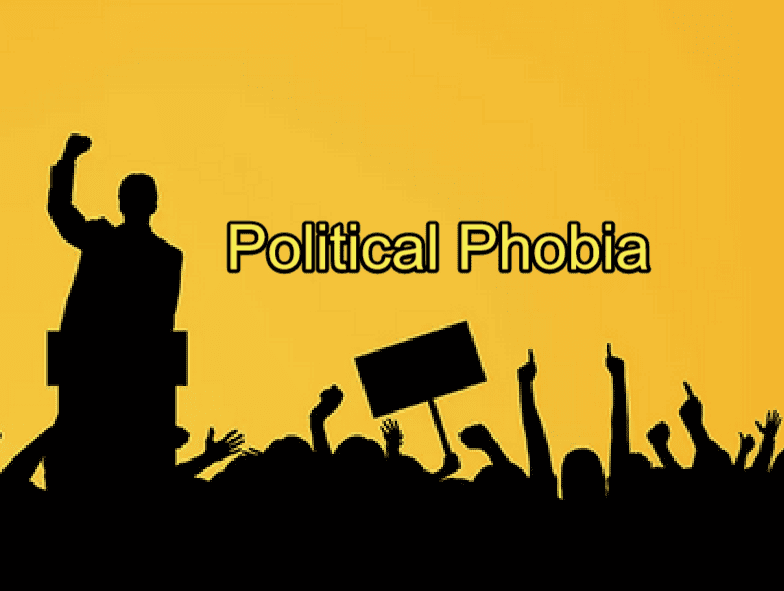Share This Article
Political Phobia Meaning
What is meant by “political phobia”? Although the term may seem like something from a strange online quiz, it’s actually becoming more and more popular, particularly in the highly charged political environment we live in today. Although the phrase “political phobia” isn’t officially recognized in psychology (yet!), it’s more often used to refer to an extreme, illogical dread or aversion to politics or political discourse.
Imagine this: As you browse through your social media feed, a barrage of negative content, incessant fights, and intense political debates appear out of nowhere. Alternatively, you could be at a family meal when the topic of politics comes up. In that case, the atmosphere changes, tensions increase, and your heart starts to race. If the mere notion of these situations makes you want to hide from the world, you may be suffering from what many refer to as political phobia.
This “phobia” might take on different forms. When politics are brought up, some people experience extreme anxiety. Some, on the other hand, have a deep-seated antipathy that makes them completely avoid engaging in or talking about politics. In severe circumstances, it may potentially cause panic episodes or very strong stress reactions. However, why does this occur?

Why Develop a Political Phobia?
To begin with, politics can cause division. It frequently pushes people to face underlying differences in values and ideas, which can be quite difficult. In the modern world, when politics permeates practically every part of our existence, it can be challenging to avoid the never-ending onslaught of facts, viewpoints, and—let’s face it—drama. This setting has the potential to develop into a full-blown phobia for someone who is already prone to worry or stress.
The dread of confrontation or disagreement is another aspect that exacerbates political phobia. It’s a fact that political conversations may rapidly become heated, and not everyone can handle such a high degree of intensity. Another important factor may be the fear of destroying connections or facing rejection because of one’s opinions. It’s similar to treading carefully because saying the incorrect thing could cause a rift with friends, family, or coworkers.
The worst part is that staying away from politics completely isn’t always a good idea. Whether we like it or not, politics has an impact on a wide range of areas of our lives, including social issues, the economy, and the environment in which we live. How then may a person suffering from political phobia manage?
Examples of a Political Phobia
Different people experience political phobia in different ways, depending on their background, level of sensitivity, and exposure to diverse political environments. To demonstrate how political phobia could manifest in a person’s life, consider the following four hypothetical examples:
1. Social Media Takedown
Emma used to love using social media to keep up with friends and remain informed. She began to feel overpowered, though, as political arguments on these forums grew more regular and heated. She began to feel a great deal of anxiety from the nonstop onslaught of political viewpoints, news, and disputes. Despite the fact that this meant losing contact with some facets of her social life, Emma’s response to the stress was to totally shut down her social media accounts and withdraw from online networks.
2. Fear of Family Get-Togethers
Michael despises family get-togethers. Not because he doesn’t love his family, but rather because politics constantly comes up at family events. He had previously watched and participated in tense arguments that resulted in yelling bouts and wounded sentiments. He gets anxious now just thinking about those conversations. Consequently, Michael frequently justifies his absence from family gatherings, particularly during politically tense periods such as election seasons.
3. Staying Away from News and Current Affairs
Sara used to be quite interested in current affairs and pride herself on knowing a lot of information. But the nonstop barrage of divisive political news began to wear on her mental state, causing her to have insomnia and a persistent sensation of unease. Sara decided to cut herself off from all political news sources, podcasts, and articles. By doing so, she felt more detached from the outside world but also more at peace.
4. Aversion to Talking Politics
Alex likes to have in-depth conversations and hang out with pals. But if the conversation drifts into politics, Alex shows signs of anxiety and seeks to change the subject. His dread is a result of a few instances in which voicing his ideas provoked arguments and insults. Because of his phobia, Alex is now reluctant to make new friends or speak up in social situations for fear of unintentionally starting a political argument.
The people in each of these cases suffer from a type of political phobia that affects their ability to communicate with others, how they take in information, and how they live their lives in general. Finding healthy coping strategies and methods to interact with political content without being overwhelmed is essential for preserving a balanced viewpoint and general well-being, even if these reactions are understandable given how politics can be so controversial.
Managing a Political Phobia
First, it’s important to establish limits. It’s acceptable to avoid difficult conversations and to restrict your exposure to political content, particularly on social media. This is about safeguarding your mental health, not burying your head in the sand.
Participating in politics on your own terms has its own benefits as well. Learn as much as you can about the topics that are important to you. Your self-assurance will increase as a result, and you might even develop a constructive interest in politics.
And let’s not undervalue the significance of conversation. Talking politics in an open and courteous manner can help dispel some of the myths surrounding it. Finding common ground and realizing that it’s acceptable to disagree are key.
Finally, receiving assistance from a mental health expert might offer you with coping techniques customized to your needs if your political phobia is significantly affecting your life.
Political fear may not seem like much in the big picture, but it is a reflection of the times we are living in. It emphasizes how important it is to be polite, understanding, and most importantly, able to listen. Ultimately, our mental health should not be sacrificed in order to successfully navigate the turbulent waters of politics. So, the next time politics comes up, remember that it’s acceptable to stand back and take care of yourself, take a deep breath, and set your boundaries.



